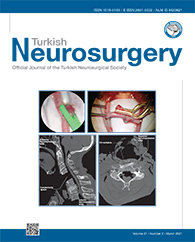2Acibadem Mehmet Ali Aydınlar University , Vocational School of Health Sciences, Istanbul, Turkey
3Van Training and Research Hospital, Neurosurgery Clinic, Van, Turkey
4Dicle University School of Medicine, Department of Neurosurgery, Diyarbakir, Turkey
5Medicana Bursa Hospital, Neurosurgery Clinic, Bursa, Turkey
6Ankara Yildirim Beyazit University, Department of Neurosurgery, Ankara, Turkey
7Marmara University, Department of Neurosurgery, Istanbul, Turkey DOI : 10.5137/1019-5149.JTN.30237-20.2 AIM: To evaluate the protective effects of azathioprine, a macrophage-inhibiting agent, on secondary injury in spinal cord trauma.
MATERIAL and METHODS: A total of 40 Wistar rats were randomly divided into 4 groups. All the animals had undergone T8-10 laminectomy. Except in group I (control), all the animals were exposed to spinal cord trauma at the T9 level. Animals in group II (trauma) received no treatment following trauma. Animals in group 3 (treatment) and group IV (vehicle) were given intraperitoneal azathioprine 4 mg/kg and saline 2 ml, respectively, 30 minutes after the trauma. Half of the animals in each group were sacrificed 24 hours after injury and specimens were used for biochemical and immunohistochemical evaluations. The rest of the animals were followed-up for 4 weeks in terms of neurological functions and were also sacrificed to perform the histopathological analysis.
RESULTS: Significant decrease in apoptotic cells and improved neurological function were observed in the animals treated with azathioprine. Biological and immunohistochemical analysis also showed less oxidative stress in this group compared to those without treatment.
CONCLUSION: Azathioprine, a potent macrophage-inhibiting agent, has been shown to decrease the extent of secondary injury following spinal cord trauma.
Keywords : Trauma, Spinal cord injury, Secondary injury, Azathioprine, Rat




